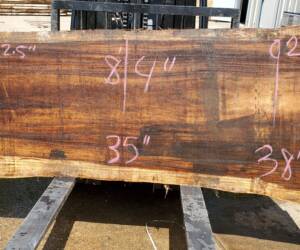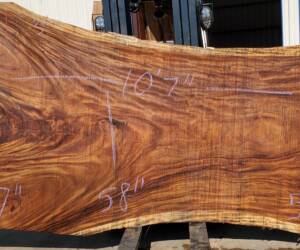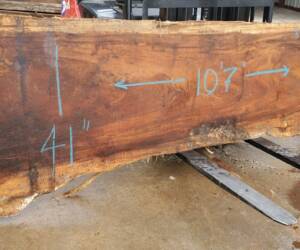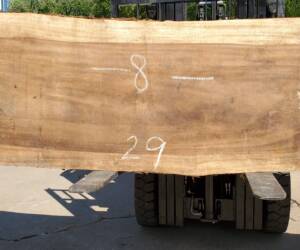Description
MONKEYPOD SLAB #0271
RAINTREE
Common Name(s): Monkeypod, Suar, Raintree
Scientific Name: Albizia saman, Samanea saman
Distribution: Central and South America (Also planted/naturalized in many tropical regions of the world) Fiji, Vanuatu, and Indonesia
Janka Hardness: 900
Color/Appearance: Color tends to be a golden to dark brown, with darker streaks. Sapwood is usually thin and yellow/white, clearly demarcated from the heartwood. Monkeypod is sometimes seen with highly figured curly or wild grain patterns.
Grain/Texture: Wavy and often quite severely interlocked. Some quartersawn faces resemble black walnut both in dark brown and streaky colors and in the striped figure. Texture is intermediate, medium to coarse open pores and a moderate natural luster.
Endgrain: Diffuse-porous; large to very large pores in no specific arrangement, very few to few; solitary and radial multiples of 2-3; heartwood deposits occasionally present; narrow rays usually not visible without lens, normal spacing; parenchyma vasicentric, lozenge, and confluent.
Workability: Monkeypod is generally easy to work with both hand and machine tools, though any interlocked grain may result in fuzzy or torn grain during planning operations. Glues and finishes well.
MONKEYPOD SLAB #0271 Pricing/Availability: Available as lumber, as well as craft wood in smaller sizes. Prices are in the mid to high range for imported wood. Monkeypod usually trends a little bit cheaper in price than Koa, all other things being equal. Boards with figured grain patterns are much more expensive.
Sustainability: This wood species is not listed in the CITES Appendices or on the IUCN Red List of Threatened Species.
MONKEYPOD SLAB #0271 Common Uses: veneer, plywood, millwork/trim, carving, cabinetry, furniture, table tops, musical instruments (guitars and ukuleles), and other small specialty wood items.






Reviews
There are no reviews yet.